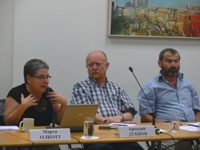Registration
You will receive an email confirming your registration.
IMGXYZ2601IMGZYXThe future for Kyrgyzstan remains unclear. The country could end up on the verge of a coup d’etat once again. Furthermore, the nature of the political systems in other Central Asian states creates the risk that conflicts such as those recently seen in Kyrgyzstan could break out in neighboring countries.
The recent events in Kyrgyzstan – the overthrow of Kyrgyz President Bakiyev, followed by interethnic clashes between Kyrgyz and Uzbeks, and the recent referendum where voters approved a plan to give the parliament greater powers – were the subjects of discussion at a seminar held at the Carnegie Moscow Center. Speakers included Arkady Dubnov, international analyst at Vremya Novostei newspaper, and Carnegie’s Martha Brill Olcott. The event was moderated by Carnegie’s Alexey Malashenko.
Assessment of Recent Events in Kyrgyzstan
- Collapse: The recent events in Kyrgyzstan are comparable in significance to the events in Moscow in September-October 1993, when the last institutional vestiges of Soviet power crumbled away, and are evidence of yet another stage in the Soviet Union’s slow collapse, Dubnov suggested. Kyrgyzstan has no strongman on the lines of Chechen President Ramzan Kadyrov, whose strong personality and political ties enable him to control his republic. None of the country’s political figures – Miroslav Niyazov, Kubat Baibolov, or Felix Kulov – have the weight to play this role.
- Ethnic Character: The underlying causes of the recent coup in Kyrgyzstan were not ethnic in nature but rather are rooted in civil instability, Olcott contended. The events subsequently took on an ethnic dimension, but this ethnic aspect does not reflect the real essence of recent developments in Kyrgyzstan.
- Yet to Come: The current calm in Kyrgyzstan may be just a hiatus, Malashenko noted, because the new government still has ahead of it the task of addressing the country’s main political problems and smoothing relations with its neighbors.
The U.S. and Russian Positions
The events in Kyrgyzstan showed that neither the United States nor Russia is ready to play a real leadership role in Central Asia, said Dubnov. Neither is willing to take on responsibility for maintaining stability in the region. This seriously undermines their claims to leadership and exclusive interests in the region.
Dubnov outlined some of the key factors that determined Moscow’s position on the Kyrgyz-Uzbek clashes:
- Lack of peacekeepers trained for Central Asian conditions;
- Preference for acting under a mandate from the UN and other international organizations;
- Effects of the so-called “South Ossetian syndrome,” arising from the August 2008 war with Georgia, which made Moscow concerned that it could be accused of an invasion;
- The biggest determining factor, however, in shaping Moscow’s position was the opposition in Uzbekistan, which wouldn’t have tolerated the idea of having a peacekeeping contingent right on its border.
Uzbekistan’s Position
Tashkent’s cautious position during the violence in Kyrgyzstan resulted from fears among the Uzbek leadership that Uzbekistan could end up engaged in ethnic conflict with Kyrgyzstan, Dubnov stated. However, Uzbek President Islam Karimov succeeded in using the situation to his full advantage. He argued that only by taking heavy handed action, as the Uzbek authorities did in Andijan in 2005, is it possible to prevent public chaos and anarchy. This gave Karimov the sanction he sought for his actions in 2005.
Ultimately, Karimov used the situation in Kyrgyzstan as proof of his belief that there never was and never would be any “island of democracy in Central Asia” – something that Kyrgyzstan had attempted to position itself as.
Kyrgyzstan’s Future
Kyrgyzstan’s future depends on the ability of the authorities to restore public order, Olcott said. This will require:
- Reasonable behavior of the authorities in the poorest parts of the country, located in the south;
- Competent work by the security agencies and their ability to normalize and manage the situation in the south of the country;
- A positive position taken by local elites, especially in the south, towards the Interim Government in the transition period leading up to the parliamentary election.
Olcott warned that Kyrgyzstan is at risk of ending up on the verge of a new coup. The following factors heighten this threat:
- Preparations for the parliamentary election will not be easy, and there remains the possibility that the election could be postponed if an emergency situation is declared in the country;
- There will be difficulties in implementing the new constitution’s provisions, especially in forming a majority party in parliament to name the prime minister and formulating the country’s national development program;
- The crucial need to maintain economic order in the country.
Central Asia’s Long-Term Future
Following the speakers’ presentations, the participants at the event discussed the future for Central Asia. Alexander Kadyrbayev of the Russian Academy of Sciences’ Institute of Oriental Studies predicted that conflicts similar to what occurred in Kyrgyzstan will become more frequent, as they are a product of the political system that has taken shape in Central Asian countries since the collapse of the Soviet Union. Kadyrbayev underscored that the unhealthy power systems dominated by the main ethnic groups in the specific countries need to be prepared for these kinds of events. Sergey Abashin, also of the Russian Academy of Sciences’ Institute of Oriental Studies, said that the events in Kyrgyzstan have set off long-term negative processes by demonstrating the Uzbek community’s problems not just in Kyrgyzstan but throughout Central Asia.
